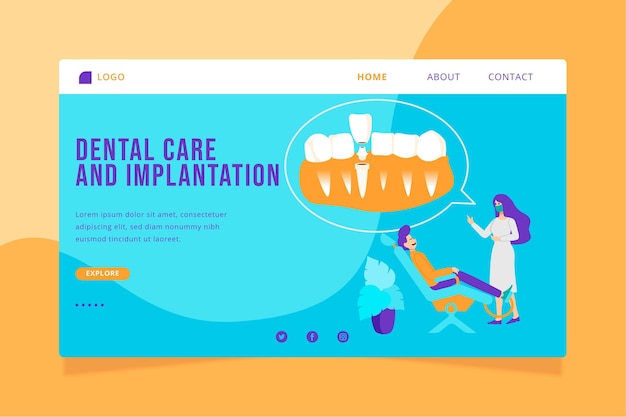
Medical advancements have paved the way for effective, long-term solutions to chronic health issues, and one such breakthrough is dental implant surgery. This procedure addresses the problem of missing teeth by providing replacements that look, feel, and function just like natural teeth. Dental implants are more durable and reliable than traditional dentures, with an impressive success rate of over 98%, making them a preferred choice for patients dealing with tooth loss or decay.
Losing teeth can impact more than just your ability to eat or chew—it can take a toll on your self-esteem and confidence, especially when it comes to smiling or socializing. Dental implants offer a comprehensive solution to these concerns. They are custom-made under expert supervision to match the size, color, and texture of your natural teeth.
Another advantage of dental implants is that they may be covered by insurance, just like many other medical procedures, provided the patient has the appropriate coverage. This makes dental implants an increasingly recognized and accessible treatment option for missing teeth in dental care.
### What Is Dental Implant Surgery?
Dental implant surgery replaces the root of a missing or damaged tooth with a screw-like metal post, which serves as a base for an artificial tooth. This artificial tooth is designed to look, feel, and function like a natural one. Unlike bridges or dentures, which may not fit well or require support from adjacent teeth, dental implants stand independently and do not affect surrounding teeth.
Typically made of titanium, these implants integrate seamlessly with the jawbone, ensuring they are accepted by the body as natural elements. This integration process can take several months, allowing time for healing and stabilization. The procedure begins with assessing the patient’s specific needs, including the condition of their teeth and jawbone, as well as any other relevant health concerns.
### How Dental Implant Surgery Works
1. **Placing the Metal Post:**
The first step involves inserting the titanium post into the jawbone. This requires the surgeon to make a small incision in the gums and drill a hole into the bone where the implant will be placed. While the initial gap remains after the procedure, a temporary denture can be used for aesthetic purposes until the implant process is complete.
2. **Osseointegration:**
After the post is implanted, the jawbone gradually fuses with it in a process called osseointegration. This creates a stable foundation for the artificial tooth, but it requires several months to fully develop.
3. **Placing the Abutment:**
Once osseointegration is complete, a small connector called an abutment is attached to the implant during a minor surgical procedure. The gum tissue is adjusted to fit around the abutment, which will hold the artificial tooth in place.
4. **Artificial Teeth Selection and Placement:**
An impression of your teeth is taken to create a crown that matches the size, shape, and color of your natural teeth. Depending on your preference, you can choose between removable or fixed artificial teeth. Fixed teeth are permanently attached to the abutment, while removable ones function like traditional dentures and can be taken out for cleaning.
### Recovery and Post-Surgery Effects
After surgery, it’s common to experience mild discomfort such as swelling, bruising, minor bleeding, or pain around the implant site. These symptoms are typically managed with medications prescribed by your surgeon. If discomfort persists, it’s important to consult your dentist promptly.
### Advantages of Dental Implants
– **Durable and Long-Lasting:** With proper care, dental implants can last for many years or even a lifetime.
– **Preserves Surrounding Teeth:** Unlike bridges, implants do not require altering nearby teeth for support.
– **Natural Appearance:** Implants are designed to match your existing teeth, offering a seamless, natural look.
– **Improved Function:** They feel and function like natural teeth, making it easier to eat, chew, and speak.
– **Boosts Confidence:** A dental implant restores missing teeth, allowing you to smile and socialize without hesitation.
– **Oral Health Maintenance:** Implants make it easy to maintain good oral hygiene, as they can be brushed and flossed like natural teeth.
### Risks Involved
While dental implant surgery is generally safe, minor risks include infection, injury to nearby teeth or blood vessels, and nerve damage that could cause temporary pain or numbness. Implants placed in the upper jaw may occasionally lead to sinus issues. However, these complications are rare and treatable.
### Cost of Dental Implants
Dental implant costs vary depending on location, resources, and the expertise of the surgeon. On average, the procedure costs between $3,000 and $4,000, covering all steps from start to finish. Although some insurance plans offer partial coverage—typically for the crown portion—many consider dental implants an elective procedure, leaving patients to cover most of the expenses themselves. To reduce financial stress, it’s advisable to check insurance policies for coverage details before proceeding.
### Who Is Eligible for Dental Implants?
Dental implants are suitable for most people experiencing tooth loss due to decay, injury, or weak roots. They are particularly beneficial for patients who find other treatments like dentures or bridgework unsuitable. However, individuals with uncontrolled diabetes, severe heart issues, or those over 75 years old with weakened gums may not qualify for this procedure.
### Final Thoughts
Dental implants are a game-changing solution for replacing missing teeth, combining durability, functionality, and aesthetics. While the process may take several months and involve multiple steps, the results are well worth it, offering a permanent, natural-looking replacement. Whether you’re seeking improved confidence, functionality, or long-lasting oral health, dental implants deliver a reliable solution tailor-made for your needs.